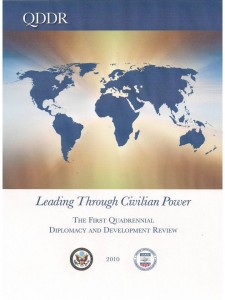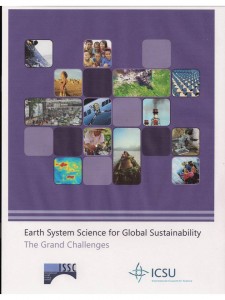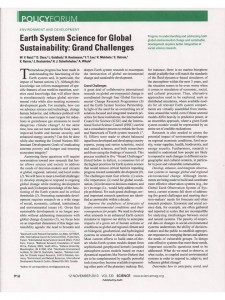
Phi Beta Iota: The US Government continues to be chaotic in part because its civilian leaders simply do not know what they do not know. They have the best of intentions, but have been promoted into a new world far removed from the world imprinted on them in their formative years. There are four ways to address global engagement needs:
1. With government employees performing inherently governmental functions. PROBLEM: The US Government has become hollow, with most of the experienced personnel scheduled for retirement in 2012 (if they don’t retire we lose what is left of the middle), and the bulk of the population, e.g. at CIA, having less than six years experience and being phenomenally ignorant of the real world. An inter-agency cadre for D&D does not exist.
2. With contractors hired to government specifications on a cost plus basis. This is what killed the Pentagon–decades of engineering responsive to military specifications on a cost plus basis, with no accountability anywhere. As we have seen in Iraq and elsewhere, individual instances aside, contractors are generally too expensive, very under-qualified, and often a major political risk hazard. They also loot our qualified manpower–in both intelligence and special forces, we have lost too many good people to bad jobs with too much money.
3. Multinational government task forces in which we plan, program, and budget for using the US military as a “core force” to provide intelligence, operations (mobility, logistics), and communications, and we default to unclassified information-sharing and sense-making. This allows culturally and linguistically qualified individuals to work at the highest levels of performance for the lowest per capita cost.
4. Multinational hybrid task forces in which we plan, program, and budget for using the US military as the “core force” to provide intelligence, operations (mobility, logistics), and communications, and we default to unclassified information-sharing and sense-making. This increases by a factor of SEVEN the number of culturally and linguistically qualified individuals to work at the highest performance levels for the lowest per capita cost with the greatest possible flexibility in covering all needs–the “eight tribes” (academia, civil society, commercial, government–all levels, law enforcement, media, military, non-governmental) become a “whole” force, using shared information and shared mostly unclassified decision support (intelligence) to achieve both a common view of the battlefield, and to most efficiently connect micro-needs in the AOR with micro-gifts from an infinite range of givers.
The Quadrennial Diplomacy and Development Review is at least 20 years too late. It means well. It is both delusional and incomplete. Delusional because no one part of government can become effective until the Office of Management and Budget (OmB) learns to manage again, and incomplete because State simple does not “get” bona fide multinational operations or recognize the “eight tribes.” There is a small seed crystal here, one that could flourish if the Department of Defense (DoD)–or any significant element of DoD such as the US Army–were to “flip the tortilla” and recognize that the greatest contribution DoD can make in the next 20 years is to get a grip on reality, get a grip on open spectrum, open source intelligence, and open source software, and serve as the “center” for Whole of Government planning, programming, and budgeting, toward the end of creating a prosperous world at peace via low-cost low-risk multinational hybrid task forces that use information and intelligence as a substitute for wealth, violence, time, and space.
NOTE: On some systems links above appear to be underlining, they are actually links.
See Also [Broken Link Fixed]:
Continue reading “Reference: Quadrennial Diplomacy & Development Review”









